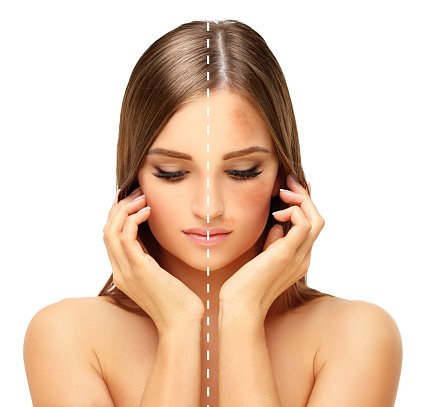How To Build The Best Acne Skincare Routine- Your Acne Free Skin Checklist
ACNE! It is probably the most hated four-letter word every human has in their vocabulary and is among the most common skin issues that most of us experience at some point in our lives.
But, the real question is: “Can we have acne-free skin?” and the answer is yes! It is achievable with a consistent skincare routine.
WHAT IS ACNE?
Acne is a common skin condition that affects many people at some point in their lives. It is characterised by the appearance of pimples, blackheads, and whiteheads on the skin, usually on the face, chest, and back. it stand out
SO, WHAT CAUSES ACNE ON YOUR SKIN?
Acne occurs when the hair follicles (or pores) in the skin become clogged with oil and dead skin cells. When this happens, bacteria can grow in the pores, leading to inflammation and the formation of blemishes, or “spots”. Check out our ultimate skin care routine for a deeper understanding of getting clear skin.
There are many reasons why we get acne beyond a great skincare routine:
Hormonal imbalances: Hormonal fluctuations, such as those that occur during puberty, pregnancy, and the menstrual cycle, can increase the production of oil in the skin and contribute to the development of acne.
Genetics: Genetics play a vital role in your skin type and development as well. You can develop skin problems if your family has skin issues in the past.
Diet: Unhealthy diets are a leading cause for acne among teenagers, excess sugar and oil in your diet can contribute to acne prone skin. What you eat generally has an effect on your skin.
Stress: Personally, this is among the common yet ignored reasons for getting acne. Stress can adversely affect your hormone levels, causing your body to react with a breakout. No wonder most of us get acne right before we have our examinations, or important meetings or dates!
YOUR ACNE-FREE SKIN CARE CHECKLIST
Wash your face twice a day
How: Do not scrub your face, be gentle with your skin when you have acne. Acne is a skin inflammation, if you scrub your face too hard, it may lead to further inflammation and redness.Follow your morning and night skin care routine. Check our blog post on the ultimate checklist for clean skin
Apply moisturiser
How: Moisturisers are essential in keeping your skin oil production balanced. So, even if you have oily skin, it is necessary that you apply a sustainable, chemical free face lotion that allows your skin to remain hydrated.Exfoliate your skin - 2 to 3 times a week!
How: Exfoliation helps in removing dead cells from your skin, if you have acne prone skin then using exfoliators with Vitamin-E properties will help your skin reduce the inflammation caused by the acne.Don’t pick at your skin
How: Avoid touching your acne at all costs! Trying to pick your acne will lead to further irritation and increased chances of a breakout.
Use a chemical free Acne product that also prevents hyperpigmentation
How: Understanding your skin type is essential in your fight against acne. Acne products work differently on different skin types, and choosing the right product for your skin will only accelerate the healing process.
What is hyperpigmentation?
Hyperpigmentation is a condition in which certain areas of the skin become darker than the surrounding skin. This can be caused by an excess production of the pigment melanin in the skin.
Hyperpigmentation can be treated with a variety of methods, including topical lightening agents, chemical peels, and laser treatments. It is important to use sun protection and to avoid picking or squeezing pimples to prevent hyperpigmentation from worsening.
6 CLINICALLY PROVEN TIPS TO PREVENT ACNE
The fight against acne is definitely a battle we can win. However, it is important that we follow certain routines and use products that can combat the problem of acne. Here are some clinically proven tips to prevent acne that you can follow in your day-to-day routine:
Avoid picking or squeezing pimples: Picking or squeezing pimples can cause inflammation and can lead to scarring. If you have a pimple, it is best to leave it alone and let it heal on its own.
Use appropriate Sunscreen: Sun exposure can stimulate the production of melanin in the skin, leading to hyperpigmentation and potentially worsening acne.
Quit Smoking: Smoking is absolutely terrible for your skin health. Cutting down or eliminating smoking from your daily routine can significantly reduce chances of acne on your skin.
Drink a lot of water: When you drink water, your skin gets the essential nutrients to fight against skin inflammation as it helps in removing the toxins that accumulate in your body over time.
Chemical free Acne products: When it comes to your body and skin, going chemical free can significantly help your skin health and reduce acne problems.
Control the intake of sugar: According to a study conducted by the American Academy of Dermatology, sugar can increase the chances of having skin inflammations.
If one follows these tips and curates a skin care routine for their skin, it is possible to significantly reduce acne breakouts.
“The key to a healthy, acne free skin lies in the consistency of your skin care routine and habits!”
However, it is not uncommon for acne to return or to develop new acne breakouts, even in people who have had success in managing their acne in the past. So, follow your skin care routine and watch the magic it does on your skin.



